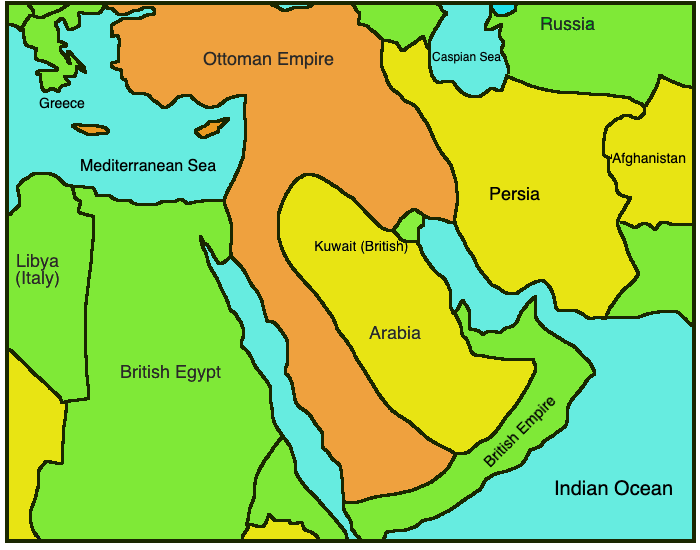| Major Fronts of World War I |
| Western Front |
| Eastern Front |
| Italian Front |
| Balkan Front |
| Middle-Eastern Front |
| African Front |
Middle-East Region during World War I The Middle-Eastern Front of World War I was one of the most complex and fascinating theaters of the Great War. The conflict in this region saw the involvement of a number of nations, each with their own motivations and objectives. The outcome of the fighting would have far-reaching consequences for the Middle East and the world as a whole. The Ottoman Empire, which was allied with Germany and Austria-Hungary, controlled much of the Middle East at the beginning of the war. The empire was vast, encompassing present-day Turkey, the Levant, Iraq, and much of the Arabian Peninsula. The British Empire, which had a number of interests in the region, including the Suez Canal and access to oil fields, saw the Ottoman Empire as a threat to its imperial power. In 1914, the British launched an attack on the Ottoman port of Basra, hoping to gain control of the oil fields in the region. The campaign was successful, but it was just the beginning of what would be a long and difficult conflict in the Middle East. The Ottomans were initially successful in repelling British advances, but their fortunes changed in 1917 with the entry of the United States into the war. The Americans provided much-needed resources and support to the British, which allowed them to launch a major offensive in Palestine. This campaign, led by General Edmund Allenby, was one of the most successful of the war. Allenby's forces were able to capture Jerusalem in December of 1917, a major symbolic victory that boosted morale for the Allies. The following year, the British launched an attack on the Ottoman stronghold of Mosul in northern Iraq. This campaign was led by General William Marshall, who was able to defeat the Ottoman army and capture the city. The British now had control of much of the Middle East, but the fighting was far from over. The Ottomans launched a counter-offensive in 1918, hoping to regain control of their lost territories. This campaign was led by the legendary military commander Mustafa Kemal, who would later become the founder and first president of modern Turkey. The Ottoman forces were able to push the British back, but their victories were short-lived. The war ended in November of 1918 with the signing of the Armistice of Mudros, which saw the Ottoman Empire surrender to the Allies. The aftermath of World War I had a profound impact on the Middle East. The collapse of the Ottoman Empire led to the partitioning of the region by the victorious powers. The League of Nations, which was established after the war, granted Britain and France control over much of the Middle East, including Iraq, Syria, Lebanon, and Palestine. This set the stage for years of conflict in the region, as nationalist movements sought to gain independence and create their own nations. |
